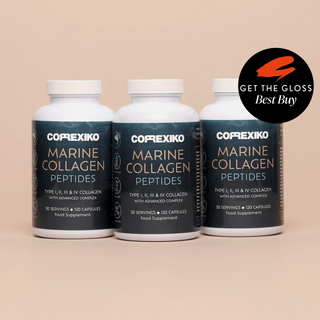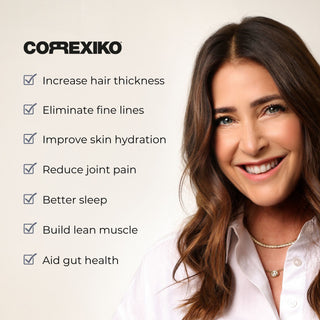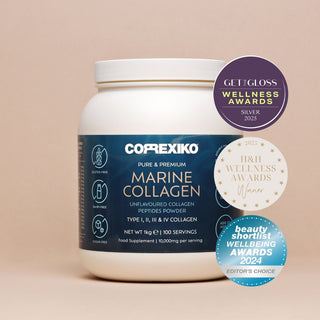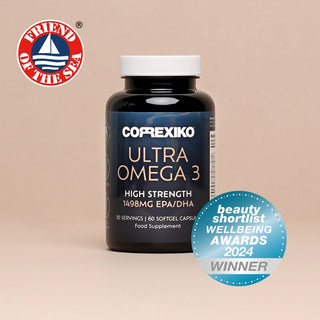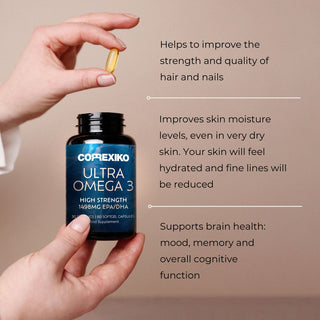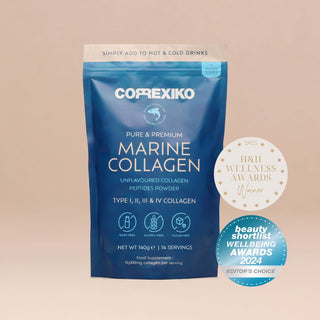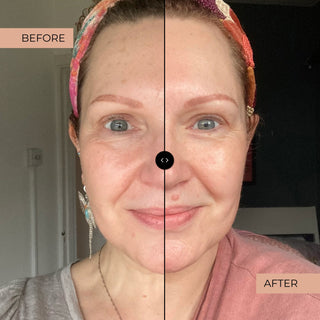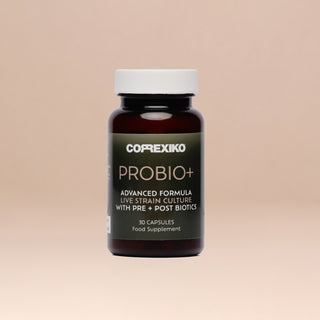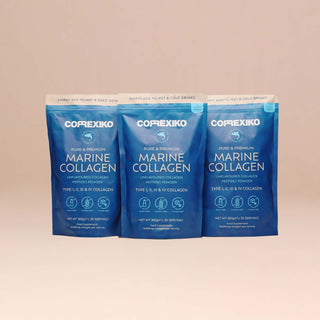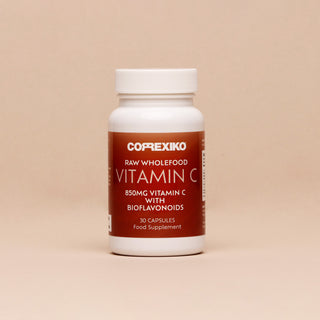Strong bones, fat burning and hydrated skin. Why nutritionists are now saying YES to more collagen.
Why collagen benefits women over 40
Collagen originally became well renowned for its powerful beauty-boosting benefits after skincare experts were recommending it for its ability to rejuvenate, plump and hydrate the skin, boost hair growth and healthy nails. But these days a whole host of medical and wellness experts worldwide are telling us to add more collagen to our diets to support everything from strong bones to a healthy metabolism. Here’s why!
Collagen 101 - Interview with Dr Naomi Newman-Beinart.
What is collagen, and where is it found?
Collagen is the most abundant protein in your body. There are over 20 types, but type 1 comprises over 90% of all collagen. Collagen is made up of amino acids, and they differ in the amount of amino acid present in a particular type of collagen. When collagen is hydrolysed, it’s broken down into its constituent amino acids, which are the essential building material to renew cells throughout the body, including skin, hair, nails, eyes, teeth, cartilage, ligaments, tendons, muscles, joints, bones, internal organs, blood vessels, and the immune system.
How does collagen benefit us as we age?
We need a collagen supplement to replace what we lose with age. Did you know that after age 18, our collagen levels start to drop, and this accelerates by 1.5% per year from the age of 30? This drop further accelerates for women with the onset of menopause.
Since ancient times, humans have consumed more collagen than we do now, and it’s been an essential source of nutrition. But modern food processing has removed collagen from our diets, and supplementing with collagen is important to regenerate our bodies for a fuller, active life.
What are the top benefits of taking collagen supplements?
There has been an abundance of research investigating the benefits of taking collagen, and here is a summary of the findings:
Taking oral collagen Improves skin elasticity and skin hydration and reduces the visibility of ageing:
In 2018, a double-blind, placebo-controlled study was carried out to investigate the effects of oral collagen peptides on skin. This study is considered the “gold standard” for this type of research, as neither the participants nor researchers know which people are taking collagen and which are taking a placebo supplement.
The researchers gave 40-60-year-old women daily oral collagen and found significant improvements in skin hydration, wrinkling and elasticity (i.e. tightening of the skin) after only 12 weeks compared to women who took a placebo supplement. Similar results were found in other “gold standard” studies by Proksch and colleagues in 2013 and Asserin and colleagues in 2015. These two studies included women aged 35 to 59 who were given daily oral collagen or a placebo supplement. These researchers found statistically significant improvements in skin elasticity after 4 and 8 weeks (Proksch et al.) and skin hydration after eight weeks (Asserin et al.).
The above research suggests that oral collagen can improve skin hydration, elasticity, and wrinkling in women aged between 35 and 60.
Collagen can help with weight management
Some people have asked me if they can gain weight from taking collagen supplements. Well, you’ll be pleased to hear that collagen supplementation has been found to support weight loss and weight management in men and women who are overweight.
There are many claims that certain supplements may help you lose weight, but there is rarely any scientific research to back up these claims. A few studies have investigated whether oral ingestion of collagen peptides may support weight loss, and these studies have shown promising results. For example, Zdzieblik and colleagues (2015) measured fat mass using DEXA x-rays in men aged 68 – 77 who took 15g of collagen peptides after resistance exercise training (3 times a week) for 12 weeks. Compared to men who took a placebo supplement, the researchers found that fat mass decreased and muscle strength increased significantly more in those who took collagen after exercise. These results suggest that oral collagen may increase the fat-reducing effects of exercise alongside the benefits of joint and bone support mentioned in the research above.
Another recent “gold standard” study investigated the effects of daily ingestion of oral marine collagen peptides in overweight men and women aged 30 – 50. After 12 weeks, Tak and colleagues (2019) found that the percentage of body fat and body fat mass (kg) (measured using DEXA) were significantly improved in those who took daily collagen compared to those who took a placebo supplement. These results suggest that there is potential for using collagen peptides to reduce body fat in overweight adults.
Collagen encourages strong bones in women after menopause
Numerous studies have investigated the role of oral collagen peptides and their effects on bone mineral density in post-menopausal women with either osteopenia or osteoporosis (aged 55 to 70). König and colleagues (2018) found that taking 5g of collagen daily for 12 months improved bone mineral density in the neck and lumbar spine, whereas women taking a placebo supplement showed no significant improvements.

Researchers Argyrou and colleagues (2020) gave 5g of daily collagen to postmenopausal women with osteopenia, together with calcium (500mg elemental calcium) and vitamin D3 (400iu). They measured blood levels of two “bone formation markers” P1NP and CTX. Bone markers measure bone turnover, the process of bone tissue breaking down and new bone tissue growing in its place. As we get older, our rate of bone turnover increases and often, old bone tissue breaks down faster than our body can replace it. This process leads to bone density loss and, eventually, osteopenia and osteoporosis. Argyrou and colleagues found that women who took daily oral collagen together with calcium and vitamin D for three months showed decreased P1NP and CTX levels, meaning their bone turnover had slowed down. Interestingly, women who took only calcium and vitamin D for the same 3-month period showed no changes in bone marker levels.
Both studies discussed here provide excellent evidence that oral collagen peptide supplementation can improve bone density and bone markers in postmenopausal women. This suggests that collagen supplementation may be useful to help reduce the risk of bone density disorders and delay the onset of osteoporosis.
Encourages healthy joints & repair
More than 60 scientific studies have displayed the positive effects of oral collagen peptides for degenerative joint diseases such as osteoarthritis.
But how do the collagen peptides do this? Clinical research has shown that the peptides stimulate the regeneration of collagenic tissues by increasing the production of collagen, thus providing the body with what it needs to increase collagen levels as they naturally decline with age.
Researchers Juher and Pérez (2015) collated the 60 available studies and found strong evidence that taking 10g of collagen peptides daily reduced collagen damage, reduced joint pain, and reduced erosion of joints (osteoarthritis). They also recorded feedback from thousands of participants in these studies and found that collagen peptides were tolerated well (i.e. were free from negative side effects) and had excellent digestibility and bioavailability, making collagen an attractive supplement to take for long-term use.
Collagen promotes healthy hair and hair growth:
Another great reason to add collagen to your daily routine is because collagen is made up of amino acids, which are then used to make different proteins, such as keratin, which makes up your hair, skin and nails.
Age and stress are a couple of factors that can cause your rate of hair growth to change. Most people will experience some hair loss as they age, as the production of new hairs can slow over time.
Collagen can help to protect your follicles against damage and help your hair grow long and healthy to the best of its ability.
Why I choose Correxiko’s Collagen Powder:
Correxiko is manufactured in Canada and packed in GMP-certified facilities in the UK and USA. It’s gut-friendly, Paleo, Keto, kosher, non-GMO, gluten-free, and with a Medical Doctor as its founder, Correxiko specialises in effective, results-led products and achieves this using only clean, effective, bioavailable natural ingredients
How much collagen should you take?
Science tells us that we need to ingest up to 10g of collagen peptides daily to gain maximum benefits.
Collagen researchers have used between 2.5g and 10g of daily collagen in their investigations and have found positive effects at these levels. Positive effects on skin elasticity were found at 2.5 and 5g daily (e.g. Proksch et al., 2013). However, research investigating reduced joint pain and reduced erosion of joints (osteoarthritis) found positive effects for those taking 10g of daily collagen (e.g. Benito-Ruiz, 2009; Juher and Pérez, 2015). Studies show improved bone density and bone markers in postmenopausal women using 5g of daily collagen (e.g. Argyrou et al., 2020; König et al., 2018). However, many women participating in this research also took calcium and vitamin D, so it is difficult to know if only 5g per day of collagen would have the same positive effects on bone health.
How should I use the collagen powder?
Collagen powder can be taken morning or night, on an empty stomach or after a meal. Mix 2 - 4 rounded tablespoons in water, juice, coconut water, smoothies, or warm or cooled herbal tea. Visit our 'how-to' guides page for more ideas.
Are there any side effects from collagen?
Great news – when research studies evaluate the positive effects of collagen, they also find out how well the product is tolerated and if there are any side effects. Researchers, Juher and Pérez (2015) collated information from approximately 60 studies where people took daily oral collagen peptides. They recorded feedback from thousands of participants who took part in these studies and found that collagen peptides were tolerated very well (i.e. were free from negative side effects) and had excellent digestibility and bioavailability, making them an attractive supplement to take for long-term use.
However, do note that it is important to use a high-quality product that has been tested for toxins and is deemed safe. This is important because marine collagen is sourced from fish, and fish products can contain heavy metals. Collagen brands such as Correxiko, only source deep sea fish (cod, haddock, pollock) from pristine Canadian waters. Their batches are independently tested for heavy metals and other contaminants.



